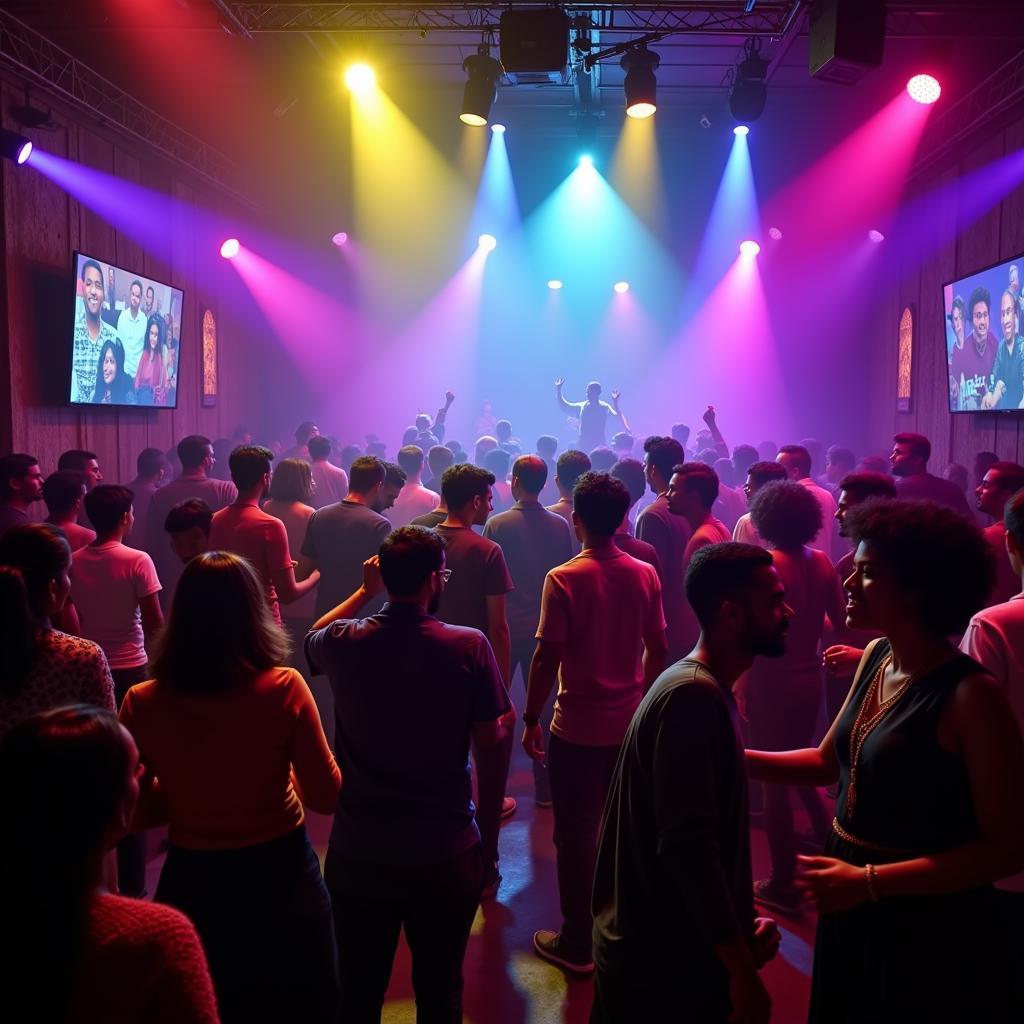African Attire: A Celebration of Dresses and Skirts
African attire is renowned worldwide for its vibrant colors, intricate patterns, and diverse styles. From the flowing gowns of West Africa to the beaded skirts of the Maasai, African Attire Dresses And Skirts are a beautiful expression of the continent’s rich cultural heritage. They are not just garments, but rather works of art that tell stories of history, tradition, and identity.
A Tapestry of Cultures: Exploring Regional Styles
The beauty of African attire lies in its diversity. Each region boasts unique styles, fabrics, and techniques that reflect their specific cultural heritage.
West Africa: A Symphony of Colors and Patterns
West African attire is characterized by vibrant colors, bold patterns, and flowing silhouettes. The iconic “boubou” is a loose-fitting robe worn by both men and women, often made from brightly colored cotton or silk. In Nigeria, the “iro and buba” is a popular style for women, consisting of a wrapped skirt (iro) and a matching blouse (buba). Ghana is known for its “kente” cloth, a handwoven fabric with intricate geometric patterns, often used to create regal dresses and skirts.
East Africa: The Elegance of Wraps and Beadwork
East Africa is home to a variety of nomadic and pastoral communities, and their clothing reflects their practical needs and cultural traditions. The Maasai people of Kenya and Tanzania are known for their striking red and blue shukas (blankets), which are draped around the body. Women often adorn themselves with elaborate beaded necklaces and bracelets. In Ethiopia, the “habesha kemis” is a long, flowing dress worn by women, typically made from white cotton and embroidered with colorful threads.
Southern Africa: Influences from the Cape to the Kalahari
Southern Africa’s attire is influenced by a mix of indigenous traditions and European colonial history. The “shweshwe” fabric, originating from South Africa, is a printed cotton fabric in vibrant geometric patterns, often used to create dresses and skirts. The Herero people of Namibia are known for their Victorian-inspired dresses, a unique blend of European and African aesthetics. In Zimbabwe, women often wear colorful “Zimbabwean cloth”, a cotton fabric with intricate patterns, to create dresses and skirts.
African Attire Dresses and Skirts: Beyond Tradition
While African attire is deeply rooted in tradition, it is also evolving to embrace contemporary trends. Modern African designers are reimagining traditional styles, incorporating new fabrics, silhouettes, and embellishments.
From Runway to Everyday Wear
African prints and designs have gained global recognition, appearing on international runways and in the collections of renowned fashion houses. Celebrities and fashion icons have embraced African attire, further propelling its popularity. This global exposure has led to a resurgence of interest in traditional African textiles and techniques, empowering local artisans and communities.
Expressing Individuality and Heritage
For many people of African descent, wearing African attire is a way to connect with their heritage and express their cultural pride. It is a powerful statement of identity, celebrating the beauty and diversity of the African continent.
Where to Find Authentic African Attire
There are many ways to find authentic African attire dresses and skirts, both online and offline.
- Local Markets: Visiting local markets in African countries is a great way to experience the vibrant atmosphere and find unique pieces.
- Online Retailers: Numerous online retailers specialize in African clothing, offering a wide variety of styles and fabrics from different countries. If you’re looking for African attire online in London, there are many options to choose from.
- African Designers: Supporting African designers is a wonderful way to promote ethical and sustainable fashion. Many African designers have their own websites or sell their creations through online platforms.
Caring for Your African Attire
African attire is often made from delicate fabrics that require special care. It’s important to follow the care instructions on the garment label to ensure its longevity.
- Handwashing: Many African fabrics are best handwashed with mild detergent in cold water.
- Air Drying: Avoid direct sunlight as it can fade colors.
- Ironing: Iron on the reverse side of the fabric to prevent damage.
Conclusion
African attire dresses and skirts are more than just garments; they are a celebration of culture, heritage, and artistry. From the vibrant colors and patterns to the intricate beadwork and embroidery, African attire is a testament to the creativity and ingenuity of the African people. Whether you are looking to embrace your heritage, express your individuality, or simply appreciate the beauty of African fashion, there is a style out there for everyone.
FAQ
1. What is the most popular African fabric?
There are many popular African fabrics, but some of the most well-known include Ankara (also known as African print), kente cloth, and shweshwe.
2. Where can I find African apparel near me?
Search online for African clothing stores or boutiques in your area. You can also check local markets and cultural events.
3. What is the best way to care for African attire?
It’s best to follow the care instructions on the garment label, but generally, handwashing or dry cleaning is recommended for most African fabrics.
4. Can I wear African attire to a wedding?
Absolutely! African attire is often worn to weddings and other special occasions. It is a beautiful and respectful choice for such events.
5. What are some popular styles of African attire dresses and skirts?
Popular styles include the boubou, iro and buba, kente cloth dresses, habesha kemis, and shweshwe skirts.
6. Are there any cultural considerations when wearing African attire?
It’s always a good idea to research the cultural significance of the specific attire you are wearing and to dress respectfully.
7. Where can I learn more about African dancing dress?
You can find information about African dance dresses online, in books, and at cultural centers. You can also learn about African garments shops and their diverse offerings. There are often dance classes and performances where you can see traditional attire in action.
More Questions?
Do you have more questions about African attire? We’d love to help! You can also learn more about the fascinating world of African Zulu dance on our website.
Contact Us:
For any inquiries, please contact us at:
Phone Number: +255768904061
Email: kaka.mag@gmail.com
Address: Mbarali DC Mawindi, Kangaga, Tanzania
Our customer support team is available 24/7 to assist you.

